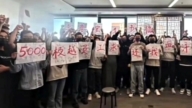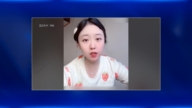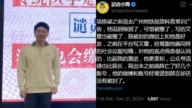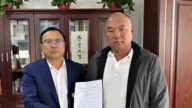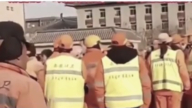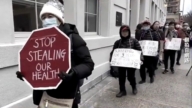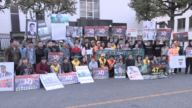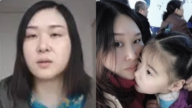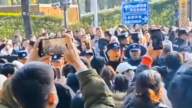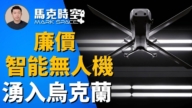【新唐人2014年06月14日讯】中共“六四屠城”25周年刚过,中共党媒《人民日报》在海外版刊登题为“我可以屠城,你不能出声”的文章。内容虽然是针对“日本反对中国把南京大屠杀等历史档案申遗”一事,但让很多网民联想起中共“六四镇压”,并表示用词太确切了!
中共“六四屠城”25周年纪念日刚刚过去一周,《人民日报》6月12号的海外版头版,却刊登一篇题为“日本的强盗逻辑 —— 我可以屠城,你不能出声”的文章。
文章痛斥“日本不断否认历史,拒绝反思历史”。
原来,10号,中共把1937年“南京大屠杀”、和日军强征“慰安妇”的历史档案,申报世界记忆名录,而日本内阁官房长官菅义伟11号要求中方撤回申请。并且声称:“感到非常遗憾”。
《人民日报》指责日方的表态是“强盗逻辑”。许多网友把文章中的“屠城”,与1989年中共“六四”坦克进京屠杀天安门抗议学生相联系。并且抨击中共当局对中国的历史进行封堵和拒绝反思。
有网友表示:“真不知道这是说日本,还是说某党….‘六四’才过去一个礼拜,这不是在搞含沙射影吗?”也有网友嘲讽:“我可以屠城,你不能出声;我可以强拆,你不能上访;我可以放火,你不能点灯,人民日报不愧为党的第一喉舌,一针见血的指出问题所在,这才是独裁政府的强盗逻辑!”
大陆网路作家荆楚表示,“六四”刚过,《人民日报》刊出这么一个标题,自然让人联想到中共25年前的那场大屠杀,用词太确切了。
大陆网路作家荆楚:“六四一直是当局的禁忌,不让议论、不让说、不让提及,它以这样的话嘲笑日本,等于自己在嘲笑它自己,看着这样的标题,给读者和观众这样一个印象:我可以屠城,你不能议论,就是讲的中国的现实嘛。”
就在一周前的“六四”25周年,中共不但严控网路,禁止人们在网路上讨论有关“六四”话题,还大肆拘捕、软禁与“六四”相关的各界人士,同时还动员全民“反恐”。
荆楚指出,中共刻意封杀“六四”信息,希望人们尽快遗忘“六四”真相,实际上,中共历次运动中屠杀的中国人,相当于几十个“南京大屠杀”。
他质问,是不是“六四屠杀”以及“文革、大跃进”等,也要申报世界记忆名录?
荆楚:“中国的反右、文革、六四,这么多丑事它不敢面对,光是一个文革,被打死的人,有资料研究就将近2000万,最惨烈的还是大跃进之后的大饿荒,官方的统计是555万,很多学者们研究应该不少于5000万。”
荆楚认为,对于历史问题,不论中共当局还是日本政府都不应选择性遗忘,掩盖真相。
1931年9月18号,日本入侵中国,到1945年8月日本投降,这15年间,上千万中国人被杀害,仅1937年“南京大屠杀”,就有34万中国军、民死亡,还有难以计数的中国女性被奸淫,仅饱受蹂躏的中国“慰安妇”就有数十万人。
世界二战结束后,1952年,时任“中华民国”总统的蒋介石与日本签定“华日和平条约”,宣告放弃对日本要求战争赔偿;1972年,毛泽东与日本发表了《中日联合声明》也放弃了对日索赔;1987年,邓小平访日,与日本签订了《中日和约》,以法律条款确定放弃对日索赔。
旅日自由学者和评论人士王进忠说,当年日本成立了一个“慰安妇基金会”,专门对受害者进行赔偿。
旅日自由学者、评论人士王进忠:“日本就慰安妇有个赔偿基金,南韩人也赔了很多,很多人没有领,中国人是大部分人不知道,所以基金后来剩了一笔钱,但是基金会它也不可能永远放在哪,就退回去了。”
香港《苹果日报》指出,在中、日关系友好的年代,中国民间对日索偿的行动,被视为“破坏两国关系”而受到打压,民间“对日索偿联合会”更被中共当成镇压对像,严加控制。
采访编辑/李韵 后制/孙宁
Party Mouthpiece Article After June 4: “I Can Massacre,
You Can’t Speak."
Straight after the 25th anniversary of the June 4 massacre, the
Chinese Communist Party (CCP) media People’s Daily put an
inflammatory article on it’s overseas edition.
Although the article is about Japan opposing China applying
for historical documents of the Nanjing massacre, many relate
it to the CCP’s repression to June 4, implying that the words
used are very accurate.
On June 12 the People’s Daily published the article on
the front page.
It was titled “Japanese Gangster Logic – I Can Massacre,
You Can’t Speak".
The article said “Japan keeps on denying history
and refusing to reflect on history."
On June 10, the CCP applied to the Memory of the World
Register for documents about the Nanjing massacre.
They also wanted information about Japan’s forced
recruitment of the ‘comfort women’.
Japan’s Chief Cabinet Secretary Yoshihide Suga requested
China withdraw the application the next day.
He said “It’s extremely regrettable."
The People’s Daily accuses Japan’s response
as being “gangster logic."
Many netizens relate the Nanjing massacre to the June 4
Tainanmen massacre of 1989 when the CCP killed students.
They denounce the CCP for blocking history
and refusing to reflect on history.
A netizen remarked, “Truly unsure if it’s talking about Japan
or some party; June 4 just past a week ago, isn’t it innuendo?"
Another netizen said, “I can massacre, you can’t speak. I can
force demolition, you can’t petition.
I can create arson, you can’t light a lamp.
The People’s Daily deserves to be the No 1 party mouthpiece.
It directly points out the key issue, which is a dictator
government’s gangster logic!"
Mainland Chinese internet author Jing Chu says such a title at
June 4 is convenient for people to think of the CCP’s massacre.
After 25 years it’s so accurate.
Jing Chu “June 4 has always been a banned topic by the CCP.
No one can discuss, talk about, or mention it.
It uses those words to mock Japan, which also mocks itself.
Such a headline gives the audience an impression that ‘I can
massacre but you can’t talk about it’, which is China’s reality."
During the 25th anniversary of June 4, the CCP strictly
controlled the internet.
It also banned any topics related to June 4.
It also rampantly arrested people involved in June 4,
and mobilized civilians against terrorism.
Jing Chu says the CCP blocks June 4 information to
have people forget about the truth as soon as possible.
In fact, the number of Chinese killed by the CCP during its
history is many times the death toll of the Nanjing massacre.
He asks if June 4, the Great Cultural Revolution the Great Leap
Forward etc. also need to be logged with the Register.
Jing Chu “The CCP doesn’t dare to face so many scandals
including anti-Rightist Campaign, the Cultural Revolution,
and June 4. A research study says nearly 20 million people
were killed in the Cultural Revolution.
The most tragic incident is the Great Famine following
the Great Leap Forward, causing 5.55 million deaths.
But many scholars researched that the death toll
was over 50 million."
Jing Chu believes that neither the CCP nor the Japanese
government should selectively forget history or hide the truth.
Japan invaded China on Sept. 18, 1931, and surrendered
in August 1945.
During the 15 years, over 10 million Chinese were killed.
The 1937 Nanjing massacre killed 340,000 Chinese
including soldiers and civilians.
An unknown number of Chinese women were raped.
The number of Chinese comfort women used by the
Japanese was over several hundred thousand.
After World War II, in 1952 President of Republic of China
Chiang Kai-shek signed a China-Japan Treaty of Peace.
This declared the intention to give up requesting
compensation from Japan.
In 1972, Chairman Mao Zedong published a China Japan
Joint Statement, also giving up the compensation.
In 1987, Deng Xiaoping visited Japan, and signed a Peace
Treaty.
This made legal provision to confirm the abandonment of
compensation from Japan.
Liberal scholar and commentator in Japan, Wang Jinzhong,
says Japan established a “Comfort Women Foundation."
This was to recompense the victims.
Wang Jinzhong: “Japan has a foundation for comfort women,
Korea also compensated a lot.
Many victims haven’t received it because most of the Chinese
don’t know about it.
The remaining money can’t stay there forever.
So, it was returned."
Hong Kong media Apple Daily says when the China-Japan
relationship was good, China’s civil requests for compensation
from Japan was considered “damaging to the two nations’
relationship," and were suppressed.
China’s civil organizations requesting compensation were
strictly controlled as the target of crackdown by the CCP.
Edit/LiYun Post-Production/SunNing


